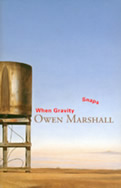 When Gravity Snaps by Owen
Marshall
When Gravity Snaps by Owen
Marshall
Vintage, pbk, $26-95
Reviewed by Lawrence Jones
Collection displays insight and versatility
When Gravity Snaps is Owen Marshall's 10th volume of short fiction and we know by now what to expect: The striking Grahame Sydney cover; the variety of types of stories, all with a realistic centre; the elegantly controlled language; the sober, existential view of life; and the combination of sympathy and clear-eyed judgement in the treatment of "ordinary" New Zealanders.
While there is nothing in the collection to displace "The Seed Merchant" and "The Master of Big Jingles" as my favourite Marshall stories, several of the 24 stories come close. The Marshall fan will find much to savour.
The range of story types he has demonstrated in his earlier collections is fully represented here. At the outer edge of his world are the fables and fantasies, where the rules of realism are suspended, as in "The Devil at Bruckner's Pond", or, more radically, "The Cormorant Devouring Time". A bit closer to the centre are the satires such as the title story or "The Language Picnic", in which exaggeration is used for satiric effect.
These shade into the purely humorous stories such "Haute Plaza New Year" or "Trusty and Well Beloved". The volume also contains memory-centred sketches and anecdotes such as "Mr Tansley" and the fuller, detailed slice-of-life sketches such as "End of Term" and the ingenious "An Indirect Geography". The latter involves a family as seen through the eyes of the just-dead mother, whose planned 90th birthday party they are travelling to Oamaru to attend.
Right at the centre are the stories of sober realism such as "Diseases of the Strong" or "Wake-up Call". It is in these that Marshall's view of life and his complex understanding of human nature are most fully expressed, often with a precise and elegant explicitness, as at the end of "Diseases of the Strong": When he was young he'd thought that eventually you reached some plateau of internal comfort in your life, with apprehension and confusion quite resolved, but he'd come to understand that all was a dancing flux of delight and agony, boredom and transformation, and that you needed to hold hands with those close to you, or be swept away.
Such a sentimental note is merely an undertone in the satires and humorous stories, giving them an implicit depth, but it comes forth most strongly in sober stories focusing on responses to death, ageing, and contingency, including "Endsong". "How it Goes", "Cock-doodle-doo is Dead" and "Changing Seasons", as well as those named above. This note has always been there in Marshall's stories such as "Descent from the Flugelhorn", but it has deepened with maturity, so that among active New Zealand writers only Maurice Gee writes with a comparable - and equally unfashionable - moral and psychological weight.
In such books as this the New Zealand tradition of a morally concerned humanist realism is kept alive in a post-modern age.